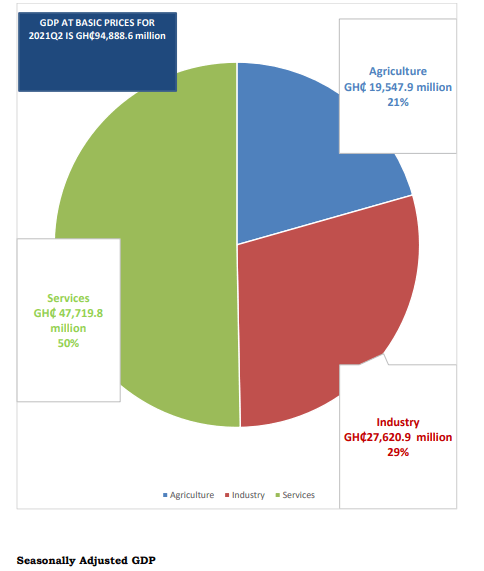The rebound of activities in the Services sector, particularly growth in the hospitality industry, has impacted positively on the economy, as gross domestic product has recorded 3.9 percent in the second quarter of the year, data from the Ghana Statistical Service (GSS) have shown.
According to the report released yesterday, the Services sector claimed its position as the main driver the economy as it grew by 11 percent in the second quarter – nearly triple the rate it grew in the previous quarter; thereby, restoring the economy into default setting mode as the sector has cemented its position as the frontrunner of growth after the Agriculture sector took over briefly.
What’s even more refreshing is the fact that the hospitality sector, which contracted heavily over the past one year, has finally emerged out of the thick quagmire, as it saw an impressive growth of 18.7 percent compared with 10.7 percent in the first quarter of the year. In fact, no sub-sector in Services saw any contraction in the second quarter.
The same cannot be said of Industry though, since it saw a contraction of 4.3 percent – sad news for a sector that showed signs of recovery in the first quarter as it grew by 1.3 percent. The shrinkage of the sector has mainly been due to the mining and quarrying sub-sector, which saw a contraction of 18.9 percent – making it the only one to experience contraction within the period.
However, the Agriculture sector continues to play a vital role in growth of the economy, especially in this pandemic period, as it grew by 5.5 percent compared with 4.3 percent in the previous quarter. No sub-sector under Agriculture experienced contraction in the second quarter.
In terms of overall contribution to growth, 50 percent came from the Services sector, whereas 29 percent and 21 percent came from Industry and Agriculture respectively.
Growth target and recovery plan
Government has targetted 5 percent growth in GDP at the end of the year. To achieve this, it has outlined some key strategies to aid in the recovery from the pandemic’s devastation. These include the Ghana Coronavirus Alleviation and Revitalisation of Enterprises Support (Ghana CARES) programme, which is expected to raise GH¢100billion to assist businesses and key sectors boost their productive capacities.
Another one is the establishment of a new Development Bank of Ghana, which government said it will begin with a seed funding of US$500million.
However, one thing that remains a threat to the country’s recovery plans is the challenge in procuring vaccines – which the World Bank has said gives cause for worry.
Country Director of World Bank, Pierre Frank Laporte, expressed this concern to the B&FT in an interview when the bank approved a US$200million second additional funding for the Ghana COVID-19 Emergency Preparedness and Response Project, which is expected to provide financing to procure vaccines for some 13 million people in the country.
“What will be critical is how fast we can deliver this; how efficiently can the Ministry of Health and World Bank team get things moving, such as procuring vaccines at the right price etc. Should this happen, I don’t expect any disruption of growth forecasts.
“But should things not go according to plan, or should the vaccine rollout not go well, the risk of COVID reemergence will be higher; and if that happens, we all know what the consequences will be – slowdown in economic activities etc.”










